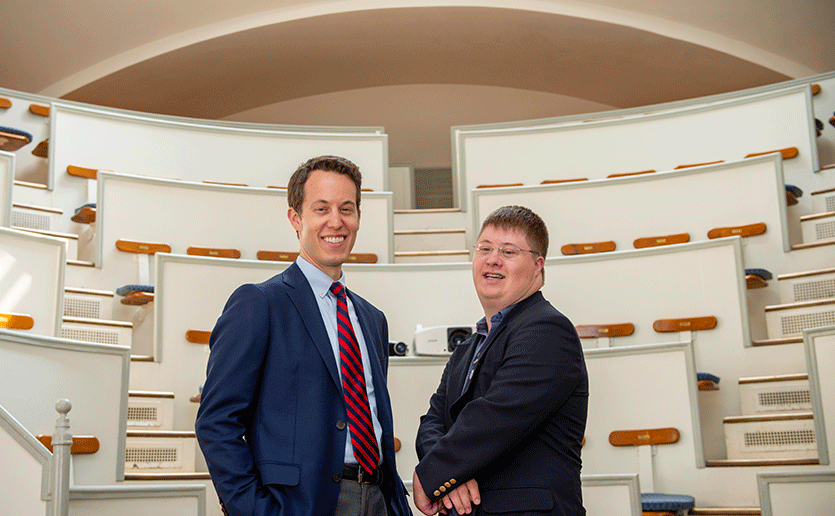As director of the Down Syndrome Program at Massachusetts General Hospital, Brian Skotko, MD, MPP, is devoted to providing care to patients who — like his sister — were born with this common genetic condition. But the times also call for a messenger. Someone to inspire more clinicians and medical institutions to provide such care. Someone to help shore up the field’s uncertain funding, especially when it comes to caring for adults with Down syndrome.
“It is so painful to turn away people who are desperate for care,” says Dr. Skotko.
“It is so painful to turn away people who are desperate for care,” says Dr. Skotko who, in recent years, has been traveling the country talking to medical students, residents and hospital faculty about the growing promise of Down syndrome care and the need for more of it.
In the meantime, he works to build philanthropic support for a permanent endowment, one that can ensure a more solid future for his own highly-regarded Mass General program and the hundreds of patients it treats.
Program Built on Generosity
“We are built now on a generous house of cards,” he explains. “Our patients deserve an endowment to build a foundation that will be here in perpetuity to provide their care.”

The increasing demand for care is due in large part to medical advances that are allowing people with Down syndrome to live longer and healthier lives. About half of children born with Down syndrome have a heart defect that surgeons can now correct. Thyroid problems and sleep apnea, two other common issues, are also more readily treated. As a result, the life expectancy for people with Down syndrome has risen to about 60 years, up from just 25 in 1950, according to research done by Dr. Skotko and his colleagues.
Even so, fewer than 10 clinics in the United States cater to adults with Down syndrome, mainly due to lack of funding. More than half of the necessary care is not reimbursable by health insurance. Most clinics that specialize in Down syndrome care stop seeing patients at age 21. Mass General’s remains one of the only full-service lifelong clinics left.
Amid such pressures, the Down Syndrome Program at Mass General and MassGeneral Hospital for Children has been struggling to maintain its adult clinic. It had to stop accepting new patients for a year and a half. Through support from families in the program and the Mass General Department of Medicine, the program was able to accept 40 new patients this year. Those slots quickly filled, however.
 Lifelong Down Syndrome Care
Lifelong Down Syndrome Care
“For every patient visit, we need to fundraise $400,” Dr. Skotko explains.
Mass General’s program runs five separate clinics: Prenatal Services, Infant and Toddler Clinic, the Child Clinic, Adolescent and Young Adult Clinic and the Adult Clinic. “In specialty clinics like ours, we know the Down syndrome medical playbook and can be on the alert for the conditions that may occur at different stages of life,” he says.

Each patient visit is carefully choreographed by a program coordinator so in one day, families see all the specialists needed for cognitive, social and medical health.
They see a nutritionist, who can help picky eaters, those struggling with their weight or who need special diets. They may see a social worker to help them access information and social services in their communities. The team psychiatrist is versed on the right medicines for those who have anxiety, depression or obsessive-compulsive disorder — conditions that can arise in adolescence. A resource specialist, a self-advocate with Down syndrome, personally greets patients and families in the clinic and answers questions.
Dr. Skotko brings a unique perspective to his work as a clinician-scientist. His sister Kristin, now age 37, has Down syndrome. Her can-do spirit inspired him to dedicate his life to research and care for those with cognitive and developmental disabilities.
Message about Meaningful Lives
Alongside providing research-based clinical care, education remains a core tenet of the Down Syndrome Program’s mission. The co-author of two books about the subject, Dr. Skotko is committed to spreading the message that with proper medical care and support, people with Down syndrome can lead meaningful lives.
He often gives presentations to medical students, residents and hospital faculty. For the past five years, he has been joined by self-advocate Edward “Ned” Reichenbach, 26, who comes to the Mass General Down Syndrome Program for his care.
“I want to help people find out about who I am and what it is like living with special needs,” Mr. Reichenbach
explains.
After high school, Mr. Reichenbach took courses at Cape Cod Community College. A former Mass General volunteer, he currently works at Boston College, in dining services during the academic year and landscaping during the summer. He lives in a group home in Newton, Massachusetts.
Tapping into Goodness
He says he enjoys telling audiences about his education and employment experiences. “I want to help people find out about who I am and what it is like living with special needs,” he explains.
Mr. Reichenbach and other people with Down syndrome have taught Dr. Skotko some important lessons. “Society often judges people’s worth by their IQ, but I’ve learned in profound ways that life is so much more,” he says. And when it comes to people with Down syndrome, Dr. Skotko adds, “there’s a lot of goodness there that we just need to tap into.”
For more information about how to support the Down Syndrome Program, please contact us.


 Lifelong Down Syndrome Care
Lifelong Down Syndrome Care